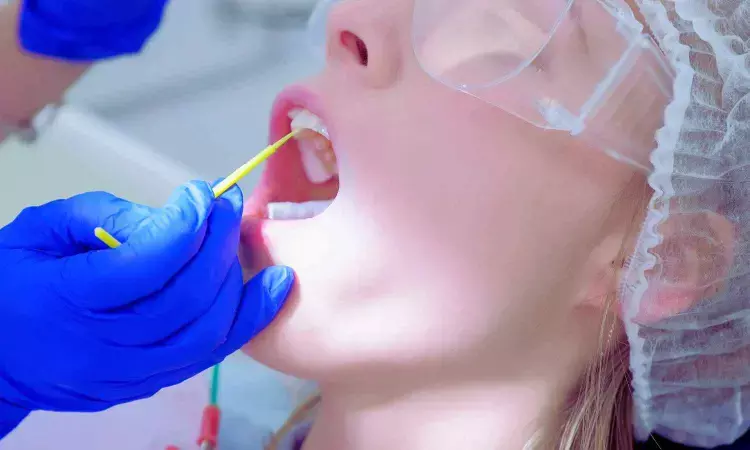- Home
- Medical news & Guidelines
- Anesthesiology
- Cardiology and CTVS
- Critical Care
- Dentistry
- Dermatology
- Diabetes and Endocrinology
- ENT
- Gastroenterology
- Medicine
- Nephrology
- Neurology
- Obstretics-Gynaecology
- Oncology
- Ophthalmology
- Orthopaedics
- Pediatrics-Neonatology
- Psychiatry
- Pulmonology
- Radiology
- Surgery
- Urology
- Laboratory Medicine
- Diet
- Nursing
- Paramedical
- Physiotherapy
- Health news
- Fact Check
- Bone Health Fact Check
- Brain Health Fact Check
- Cancer Related Fact Check
- Child Care Fact Check
- Dental and oral health fact check
- Diabetes and metabolic health fact check
- Diet and Nutrition Fact Check
- Eye and ENT Care Fact Check
- Fitness fact check
- Gut health fact check
- Heart health fact check
- Kidney health fact check
- Medical education fact check
- Men's health fact check
- Respiratory fact check
- Skin and hair care fact check
- Vaccine and Immunization fact check
- Women's health fact check
- AYUSH
- State News
- Andaman and Nicobar Islands
- Andhra Pradesh
- Arunachal Pradesh
- Assam
- Bihar
- Chandigarh
- Chattisgarh
- Dadra and Nagar Haveli
- Daman and Diu
- Delhi
- Goa
- Gujarat
- Haryana
- Himachal Pradesh
- Jammu & Kashmir
- Jharkhand
- Karnataka
- Kerala
- Ladakh
- Lakshadweep
- Madhya Pradesh
- Maharashtra
- Manipur
- Meghalaya
- Mizoram
- Nagaland
- Odisha
- Puducherry
- Punjab
- Rajasthan
- Sikkim
- Tamil Nadu
- Telangana
- Tripura
- Uttar Pradesh
- Uttrakhand
- West Bengal
- Medical Education
- Industry
Carbamide peroxide effective for partially improving silver diamine fluoride staining Lesions: Study

Researchers have found in a new study that while potassium iodide (KI) did not reduce silver diamine fluoride (SDF) staining, microabrasion showed limited aesthetic benefit. In contrast, 15% carbamide peroxide (CP) proved more effective in partially improving the color of SDF-stained lesions.
This study aimed to investigate the effect of potassium iodide (KI), bleaching, and microabrasion on the colour of caries-like lesions treated with silver diamine fluoride (SDF). Enamel specimens were demineralised and then randomised into six groups (n = 15): G1, demineralised; G2, remineralised with 38% SDF to create stained remineralised caries-like lesions (s-RCLs); G3, s-RCLs + KI; G4, s-RCLs + KI + at-home bleaching protocol (15% carbamide peroxide (CP), 4 h/d×7); G5, s-RCLs + KI + microabrasion (6.6% hydrochloric acid); G6, s-RCLs + KI + microabrasion and at-home bleaching protocol.
Colour was measured spectrophotometrically at baseline, after demineralisation, and after the treatments. Outcomes were analysed using ANOVA followed by Tukey’s test (α = 0.05). Results: The increased colour change after demineralisation (ΔE ≥ 6.7) indicated the creation of white spot lesions. G2 (ΔE = 12.3) and G3 (ΔE = 11.1) were significantly discoloured (P ≤ 0.0039), with no significant difference between them, and significantly darker (P 0.0001) than G1 (ΔE = 0.4) and G5 (ΔE = 4.4). G2 was significantly (P ≤ 0.0325) darker than G1, G4, G5, and G6 (ΔE = 0.4, 8.1, 4.4, 7.9), respectively. While KI did not reduce SDF staining, microabrasion offered limited aesthetic improvement. However, 15% CP demonstrated greater efficacy in partially improving the colour outcome of SDF-stained lesions.
Reference:
Al-Angari, Sarah S. (2025). Cariology. Open Access, Online Only. DOI: 10.3290/j.ohpd.c_21074. July 2025, pp. 371–375
Dr. Shravani Dali has completed her BDS from Pravara institute of medical sciences, loni. Following which she extensively worked in the healthcare sector for 2+ years. She has been actively involved in writing blogs in field of health and wellness. Currently she is pursuing her Masters of public health-health administration from Tata institute of social sciences. She can be contacted at editorial@medicaldialogues.in.
Dr Kamal Kant Kohli-MBBS, DTCD- a chest specialist with more than 30 years of practice and a flair for writing clinical articles, Dr Kamal Kant Kohli joined Medical Dialogues as a Chief Editor of Medical News. Besides writing articles, as an editor, he proofreads and verifies all the medical content published on Medical Dialogues including those coming from journals, studies,medical conferences,guidelines etc. Email: drkohli@medicaldialogues.in. Contact no. 011-43720751


